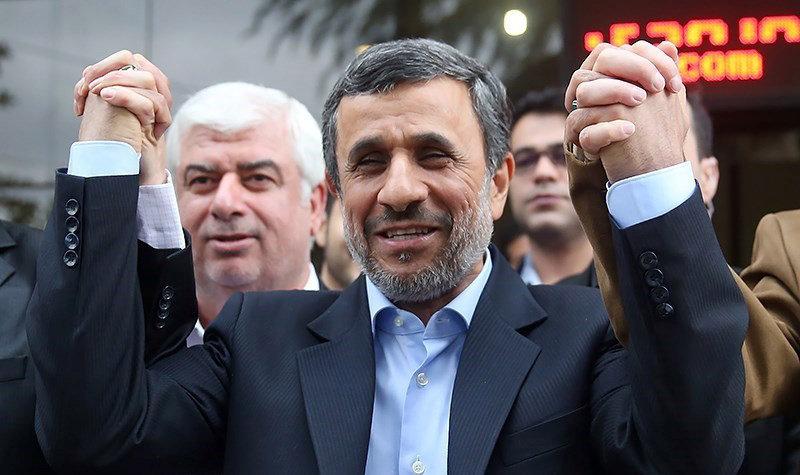Ahmadinejad letter a tribute to Saudi Arabia’s influence
https://arab.news/4svsu

In another of the Iranian regime’s unofficial initiatives — to which leaders who influence regional and global affairs have become accustomed — former President Mahmoud Ahmadinejad has sent a message, in the form of a settlement initiative, to Saudi Crown Prince Mohammed bin Salman. The aim of this message, according to its text, was to present a proposal to end the war in Yemen.
Ahmadinejad proposed the establishment of a mediation committee comprising global leaders and other prominent figures to hold talks with the Yemeni parties to resolve the crisis and end the bloodshed.
The message carries a number of meanings, implications and objectives. In addition, it is important to bear in mind who sent the message, its timing, and the prospects of the proposal’s success.
Ahmadinejad, a controversial former president of Iran, sent the message. This deprives the message of official legitimacy, as he does not influence the policies of Iran’s ruling regime. Indeed, he previously sent similar messages and proposals to former US President George W, Bush, current President Donald Trump, and the former French President Nicolas Sarkozy.
However, we cannot ignore the fact that Ahmadinejad is an influential figure in Iranian affairs, with a significant level of support and a political movement still active in Iran. Those affiliated with him did well in the parliamentary elections held in February. Also, Ahmadinejad is aware of the continuing influence and appeal of the call by his predecessor, Mohammed Khatami, for dialogue among civilizations, which, at the time, had huge global ramifications.
Mindful of this, Ahmadinejad wants to achieve similar objectives through helping to resolve the Saudi-Iranian standoff.
Regarding the timing of the message, it comes during an extremely sensitive and complicated period, which has enabled Ahmadinejad to make opportunistic political gains at home. In general, the Iranian regime and President Hassan Rouhani’s government are facing a host of criticisms and protests, which have become a regular feature of the political landscape during the tenure of the current government.
This is due to tightening economic sanctions and escalating pressure on the Iranian regime to change its behavior, which have led to horrendous socioeconomic conditions. These are tragic, to say the least, although Iran’s regime continues its expensive involvement in extensive regional conflicts, while the Iranian people suffer from an international siege that is having a devastating impact on their living standards.
Another possible incentive that motivated Ahmadinejad to send this message is his desire to exploit the differences that exist between himself and those factions of the regime, such as the Larijani brothers and the Islamic Revolutionary Guard Corps, which have fiercely criticized his economic role in their own communications with Supreme Leader Ali Khamenei. Indeed, Khamenei has gone so far as rejecting Ahmadinejad’s candidacy in previous presidential elections. There are also suggestions, however, that it is possible Ahmadinejad sent this message to the Saudi crown prince after receiving instructions from Khamenei himself to ease Iran’s isolation.
The wording of the message reflects Ahmadinejad’s acknowledgement of the Kingdom’s influence and power and its unique position in having significant leverage over several regional issues, which make it an actor the regional equation cannot bypass.
Ahmadinejad addressed Crown Prince Mohammed using positive words and phrases. These were a complete contrast to Ahmadinejad’s negative comments about Saudi Arabia during his time in office, when he played a pivotal role in ending the period of political calm between the Kingdom and Iran witnessed during the tenure of Khatami. As president, Ahmadinejad accused the Kingdom of stirring up tensions and undermining security and stability inside Iran by supporting Salafist groups in the Baluchistan region, rekindling political tensions between Tehran and Riyadh.
In his message, Ahmadinejad focused on Yemen as he is well aware of its importance to Saudi Arabia. The Kingdom’s relations with the people and the state of Yemen have been constant throughout history, underlining the importance of confronting the Iranian regime’s hostile project. This confrontation is fully legitimate and morally sound due to the Iranian regime’s destructive objectives and behavior toward Arab states, which have been repeatedly undermined in recent years.
For all these reasons, Ahmadinejad understands that Yemen is a red line for Saudi Arabia and that any successful mediation efforts could serve as the means to break the ice between the Kingdom and Iran.
The former Iranian president realizes Saudi Arabia’s regional clout and political weight, especially given the historical role it has played in standing up to Iranian expansionism and related schemes in several Gulf states in order to protect their security and stability, without seeking political or economic ambitions.
Just because Ahmadinejad is well aware of the Kingdom’s power and influence does not mean he does not seek to achieve personal objectives by sending this message. He perhaps hopes for international media success in regards to the Yemeni issue, which is one of the most difficult and contentious subjects between Saudi Arabia and Iran in the restive Middle East.
Ahmadinejad also seeks to woo the Iranian people and place himself among, or even ahead of, other candidates for next year’s scheduled presidential election, especially given the failure of Rouhani to tackle the deteriorating socioeconomic conditions.
He wants the Iranian people to believe that he has the wisdom and political awareness to manage Iran’s crises at home and abroad. He wants to suggest that his solutions will mitigate the domestic and foreign crises impacting the living conditions of the Iranian people.
This was also a message to the outside world, warning that he is capable of launching a new phase and shaping an Iranian foreign policy that is radically different from that of the current leadership. According to the message, Ahmadinejad’s policy would be based on dialogue and understanding.
Any successful mediation efforts on Yemen could serve as the means to break the ice between the Kingdom and Iran.
Dr. Mohammed Al-Sulami
Ultimately, without losing sight of the fact that the primary objective of Ahmadinejad’s message is self-promotion, we cannot ignore the fact that he, like many prominent Iranian figures, has begun to realize that Iran on its own cannot settle key regional crises, as it has previously been alleged in Iranian and global media outlets. It is an admission from a heavyweight Iranian figure that Riyadh can offer potential solutions and is considered an influential party in any regional equation. Rouhani’s reliance on European countries, meanwhile, has proved to be useless when it comes to mitigating the impact of the US sanctions. Tehran starting a dialogue with Saudi Arabia is the key to addressing many regional issues.
Finally, it is no secret that the Kingdom has repeatedly expressed its readiness to engage in dialogue with Iran in case it changes its regional behavior. All the initiatives in the world will be meaningless unless Iran alters its approach in light of the disasters and crises that the regime has unleashed on the region.
- Dr. Mohammed Al-Sulami is Head of the International Institute for Iranian Studies (Rasanah). Twitter: @mohalsulami










































